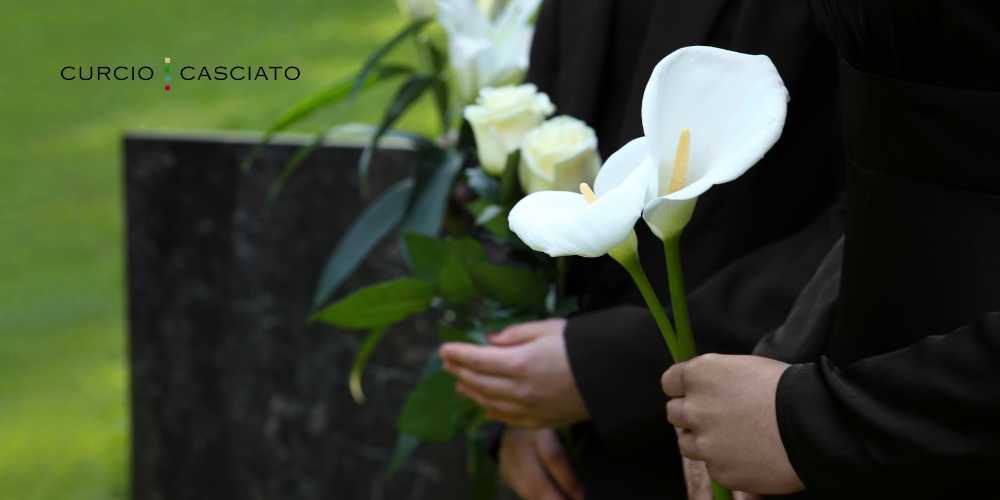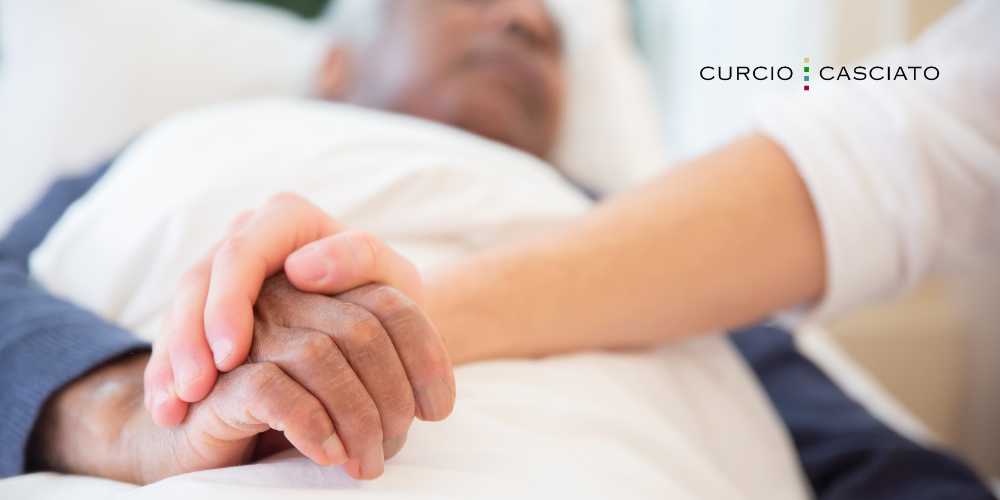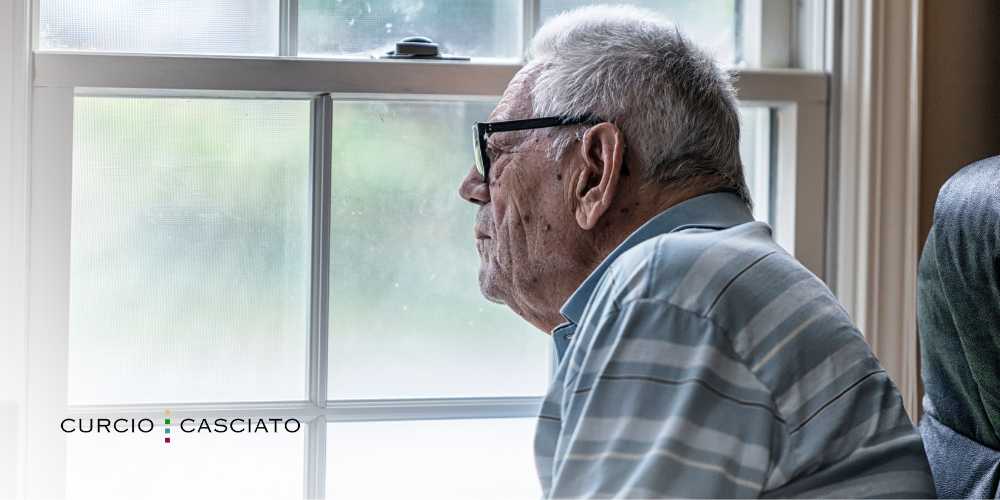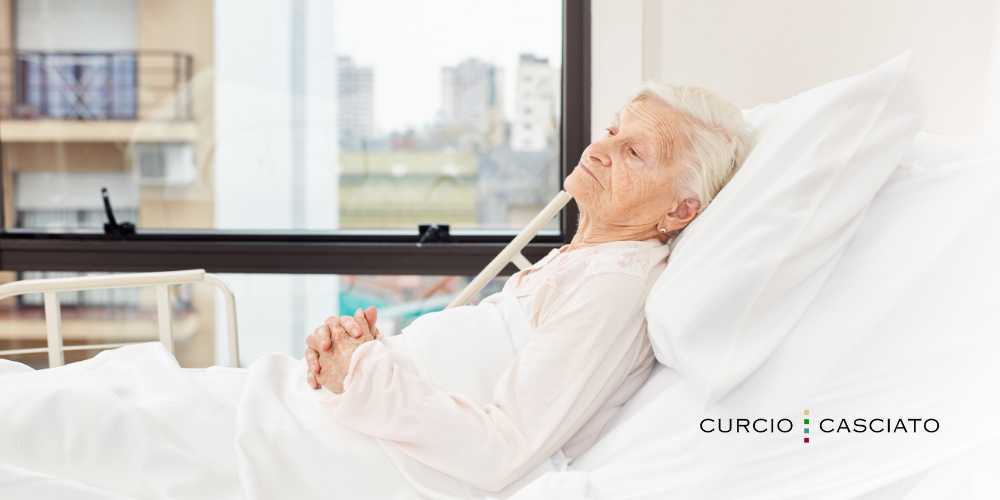CHICAGO NURSING HOME WRONGFUL DEATH ATTORNEYS
PRACTICE AREAS
If you’re searching for dedicated Chicago nursing home wrongful death attorneys, Curcio & Casciato is here to support you. Our legal team has over 65 years of experience helping immediate family members hold negligent nursing homes and assisted living facilities accountable for a loved one’s wrongful death.
In Chicago, nursing home wrongful death cases can arise from a negligent facility or even intentional harm by assisted living facility or nursing home staff members. Our experienced lawyers can gather essential medical records, assess funeral expenses and medical bills, and build a powerful nursing home wrongful death lawsuit to seek compensation and justice for the victim’s family.
Filing a nursing home wrongful death lawsuit in Chicago isn’t just about financial compensation; wrongful death lawsuits ensure the negligent facility is held responsible when a resident dies. It also helps to protect other residents.
Our Chicago nursing home wrongful death attorney team is committed to seeking justice for wrongful deaths in Illinois nursing homes. We’ll work tirelessly to hold the negligent nursing home facility accountable for the wrongful death of your loved one.
Call (312) 321-1111 or contact us online to schedule a free consultation with an experienced Chicago nursing home wrongful death lawyer.

Can I Sue For Nursing Home Neglect Resulting in Death in Chicago?
You can sue for nursing home neglect resulting in death. If a nursing home resident dies because of the nursing home’s failure to provide care or protect the resident, the victim’s family can file a nursing home wrongful death lawsuit in Chicago.
When residents enter nursing homes, the resident’s family members assume their loved ones will be well taken care of. Furthermore, nursing homes and assisted living facilities have a legal duty to provide an acceptable medical standard of care in Illinois. Nursing home negligence cases and wrongful death lawsuits arise when surviving family members choose to pursue legal action for serious injuries or a tragic death.
Our Chicago nursing home wrongful death attorney group helps immediate family hold the negligent nursing home financially responsible for medical bills, funeral costs, and other damages related to the untimely death of loved ones.
A nursing home wrongful death claim addresses your family’s losses and helps prevent similar wrongful death cases from happening to other residents. A skilled elder abuse attorney from Curcio & Casicato can guide you through the process and explain your options in a nursing home wrongful death case.
If you believe you need to file a wrongful death nursing home lawsuit in Chicago, call our law firm for a free consultation. Our lawyers work on a continency-fee basis, so families won’t owe any legal fees unless we secure fair wrongful death nursing home settlements or jury verdicts.
Chicago Nursing Home Abuse and Neglect That Can Cause Untimely Death
When nursing home abuse and neglect lead to a loved one’s untimely death, it’s important to understand your legal options. Our lawyers help family members hold negligent nursing homes accountable when the facility’s failure results in a resident’s death by filing a wrongful death nursing home lawsuit in Chicago, IL.
Below, our Chicago nursing home lawyers discuss some of the most common and preventable types of abuse in Illinois nursing homes, as well as causes of wrongful deaths in nursing homes.

Choking Accidents Caused by Nursing Home Negligence
Choking accidents in nursing homes are a serious concern, especially when inadequate supervision or improper feeding practices lead to wrongful deaths. If a nursing home resident dies due to choking, it’s typically because nursing home employees failed to follow the resident’s health care plan or provide necessary assistance during meals.
Families facing a tragic death may consider consulting a Chicago elderly choking lawyer to evaluate their options for filing a nursing home wrongful death lawsuit in Chicago against the nursing home facility. Taking legal action not only seeks justice for your loved one’s wrongful death but also addresses the nursing home’s failure to provide a basic level of care.
Untreated Nursing Home Bed Sores
Untreated bed sores in nursing homes are a severe issue that can result in wrongful deaths when nursing home residents do not receive basic care based on pressure ulcer staging guidelines. An advanced pressure ulcer, such as a stage 3 or stage 4 bedsore in Chicago is seen far too frequently in nursing home negligence cases. With a stage 4 bedsore, life expectancy diminishes greatly for nursing home residents.
Additionally, nursing homes throughout Illinois have a reputation for claiming severe bedsores are Kennedy ulcers to avoid nursing home wrongful death lawsuits and shift focus away from their negligence. While a Kennedy ulcer in Chicago can signal the natural and rapid decline of a resident’s health, it is often used as an excuse for the resident’s death.
When nursing home staff members fail to treat bedsores properly, resulting in a resident’s death, family members have the right to take legal action. A nursing home bedsore lawyer in Chicago can file a nursing home wrongful death lawsuit in Chicago, helping families seek justice and address cases of serious nursing home abuse and neglect.
Nursing Home Falls
Most nursing home falls occur when nursing home staff members fail to conduct a thorough risk fall assessment or provide proper care to prevent accidents. Whether by accident or intentional harm by nursing home employees or other residents, nursing home falls can lead to serious injuries or wrongful deaths and are common signs of nursing home abuse in Illinois.
Our Chicago nursing home wrongful death attorney team can review medical records to uncover critical evidence in wrongful death cases. Families seeking accountability after a loved one’s passing can work with a Chicago nursing home falls lawyer to hold the nursing facility responsible and file a wrongful death nursing home lawsuit in Chicago. Taking legal action ensures that victims’ families can seek compensation and justice for wrongful deaths and improve safety standards for other residents throughout Illinois.
Negligent Treatment of Nursing Home Infections
When residents enter nursing homes, families expect proper care. However, when trusted medical professionals in nursing facilities fail to treat infections or recognize antibiotic stewardship issues in Illinois, health issues can escalate into life-threatening conditions. Negligent medical treatment often leads to wrongful death cases in Illinois.
Our Chicago nursing home infection lawyer helps affected families hold the negligent nursing home financially responsible in cases where a wrongful death occurred because the resident’s health care was severely neglected. If a family member’s tragic death occurred because of a facility’s negligence, our lawyers can walk you through the process of filing a nursing home wrongful death lawsuit in Chicago.
Sepsis
Sepsis-related wrongful deaths in nursing homes often occur because nursing home employees, despite being trained to recognize the 3 stages of sepsis in Illinois nursing homes, fail to act when clear symptoms arise. Situations involving bacteremia vs sepsis are especially critical, as bacteremia indicates bacteria in the bloodstream, which can quickly progress to sepsis if left untreated.
Families who have suffered such a loss can pursue justice through a wrongful death nursing home lawsuit in Chicago, ensuring accountability for this negligence. Consulting a nursing home sepsis lawyer in Chicago can provide guidance in holding the responsible parties accountable.
MRSA
In a nursing care or assisted living facility, MRSA can spread quickly if staff members don’t follow proper hygiene or fail to keep equipment and shared spaces clean. When MRSA isn’t treated early, it can lead to serious complications and even death.
A Chicago MRSA lawyer can help you file a wrongful death claim if the nursing home failed to provide adequate care, leading to the death of a loved one.
Untreated UTIs
Untreated urinary tract infections (UTIs) are a common problem in nursing homes. For wrongful death cases involving UTI delirium in Chicago nursing homes, where infections show clear warning signs, the choice to leave residents unattended demonstrates a shocking failure of care.
If a loved one’s death was caused by the facility’s failure to treat a UTI, family members may have a valid wrongful death case. Our Chicago nursing home UTI lawyers can help you take legal action and recover financial compensation for your family’s loss through a nursing home lawsuit for wrongful death.
Resident on Resident Violence
Resident-on-resident violence in Chicago nursing facilities is a serious issue, often leading to tragic wrongful deaths. Instances of aggression or intentional harm often occur when employees don’t supervise or address known behavioral risks among nursing home residents. Families who have lost a loved one due to such negligence may be able to file a wrongful death nursing home lawsuit to hold the facility accountable. A strong wrongful death case can help ensure justice is served and highlight the need for better protections to prevent future tragedies.

How a Chicago Nursing Home Abuse Lawyer Can Help
Losing a loved one from nursing home abuse or neglect is devastating, and figuring out how to take legal action can feel overwhelming. At Curcio & Casciato, we’re here to support you every step of the way. Our dedicated legal team will investigate the circumstances, identify who is responsible, and work to hold them accountable. A Chicago wrongful death nursing home abuse lawyer can help your family file a nursing home wrongful death lawsuit and fight for the compensation you deserve during this difficult time.
Proving the Chicago Nursing Home's Negligence Caused Your Loved One's Death
To pursue a nursing home wrongful death lawsuit in Chicago, it’s critical to show that the nursing home’s negligence caused your loved one’s death. This involves gathering evidence like medical records, witness statements, and staff reports to prove that the nursing home or assisted living facility failed to provide proper care.
Whether it was untreated conditions, a preventable fall, or resident-on-resident violence, our Chicago nursing home wrongful death attorney team will work to prove that the nursing care facility was negligent and directly caused the wrongful death of your loved one.
File a Nursing Home Wrongful Death Lawsuit
When a nursing home wrongful death occurs, the victim’s family may file a wrongful death claim on their behalf. Nursing home wrongful death lawsuits can help families recover compensation for medical bills, funeral expenses, and other damages caused by the facility’s negligence.
Our Chicago wrongful death nursing home abuse lawyers work closely with families to build a strong wrongful death case against negligent facilities, ensuring that those responsible are held accountable for their actions.
A nursing home wrongful death lawsuit is a specific type of personal injury lawsuit designed to hold nursing facilities accountable and to provide families with compensation for their loss. By filing a wrongful death lawsuit, the family can seek to recover damages for the financial and emotional burdens caused by their loved one’s passing.
These damages may include medical expenses incurred before the death, burial and funeral expenses, and compensation for the pain and suffering experienced by the deceased resident and their surviving family members.
In some wrongful death cases in Illinois, the nursing home lawsuit can also seek punitive damages, which are intended to punish the defendant nursing home for egregious neglect or misconduct and to send a message that such behavior will not be tolerated.
If you believe nursing home abuse or neglect led to your loved one’s death, consulting an experienced elder abuse lawyer can help you understand your rights and take the first steps toward holding the nursing facility accountable for its negligence.
Wrongful Death Nursing Home Settlements in Chicago
Many wrongful death cases in nursing homes result in settlements that provide families with financial compensation for their loss. Wrongful death nursing home settlements in Chicago may include compensation for medical bills, funeral costs, and even punitive damages if the nursing home’s actions were especially egregious.
Our Chicago nursing home wrongful death attorneys negotiate aggressively to secure fair settlements for our clients and are prepared to take wrongful death cases to court if necessary. A nursing home wrongful death settlement can help provide closure and financial relief for your family after the pain of losing a loved one to nursing home abuse or neglect.
Before taking legal action, it’s advisable to consult with an elder abuse lawyer experienced in Illinois nursing home wrongful death cases. We can assess the resident’s health care and help you file a wrongful death nursing home lawsuit.

Chicago Nursing Home Wrongful Death FAQs
When a nursing home wrongful death occurs, families are left with many questions- especially when considering legal action. Here, our Chicago nursing home wrongful death attorney team addresses some of the most common concerns about nursing home wrongful death cases.
What is the Average Stay in a Nursing Home Before Death in Illinois?
The average stay in a nursing home before death in Illinois is approximately 5 months, with most residents passing away within a year of admission. Elder abuse and neglect are common issues that can shorten a resident’s stay and lead to nursing home wrongful death cases.
What Happens if Someone Dies in a Nursing Home Because of Neglect?
If a nursing home resident dies due to neglect in Illinois, the victim’s immediate family may file a nursing home wrongful death lawsuit to seek compensation and hold the facility accountable.
How Much is a Nursing Home Wrongful Death Settlement in Illinois?
Illinois nursing home wrongful death settlements can vary widely but often reach amounts exceeding $1 million depending on the circumstances of the wrongful death case.
Who Can Sue for Wrongful Death in Illinois?
In Illinois, the decedent’s surviving family members, such as spouse, children, and next of kin are typically eligible to file a nursing home wrongful death lawsuit in Illinois. In some wrongful death cases, life partners or financial dependents may also be eligible, but they must show how the person’s death has impacted them financially. Distant family members usually can’t file unless they are financially dependent on the deceased family member or have been named the personal representative of the estate.

Chicago Nursing Home Wrongful Death Lawyer
Losing a loved one due to nursing home abuse or neglect is a devastating experience. At Curcio & Casciato, our Chicago nursing home wrongful death lawyer group understands how overwhelming it can feel to take legal action during such a difficult time.
Our dedicated nursing home abuse lawyers are here to help you seek justice for your family and hold negligent facilities accountable. By filing a nursing home wrongful death lawsuit in Chicago, you can pursue financial compensation for medical expenses, funeral costs, and the emotional pain caused by this tragedy.
We are committed to providing compassionate and knowledgeable support every step of the way. Whether you have questions about your legal rights or need help gathering evidence for wrongful death cases, our legal team is ready to fight for you.
Call (312) 321-1111 or contact us online to schedule a free consultation.


